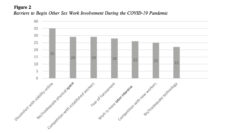What work is considered work in the U.S.? You have heard prostitution referred to as the oldest profession, but in the U.S., it isn’t a profession at all (except for a few counties in Nevada). Exchanging sex for money was made illegal in 1910 with the passage of the Mann Act. Yet, sex work is thriving. There are 1-2 million prostitutes (people who sell in-person sex and sexual favors) in the U.S., and we don’t know how many people are engaged in other types of sex work.
The criminalization of sex work compromises the health and safety of workers in the sex industry, putting them at risk for violence, exploitation, and disease. When an activity, such as exchanging sexual activities for money, is criminalized, that means the people who do said work cannot access the same public safety and support services as other workers. Sex workers struggle to report violence from clients and are often arrested rather than protected by police. And because their work is not publicly recognized, they are not entitled to unemployment benefits, worker compensation, and other work-based social services.
Prostitution is considered one of the most dangerous professions in the country with a death rate over 200 per 100,000 persons. The average person who engages in prostitution is physically assaulted every month. And people who specialize in kink-work, webcamming, and other forms of sex work experience higher rates of harassment, assault, and sexual violence than the general public. Since the start of the pandemic, the risks associated with sex work have worsened.
Public Health Post will publish articles every Tuesday in June examining how the criminalization and stigma of sex work affects workers in various sectors of the sex industry.
Public Health Post will publish articles every Tuesday in June examining how the criminalization and stigma of sex work affects workers in various sectors of the sex industry. The articles to come will explore how sex workers coped during the pandemic, relay expert knowledge from sex work decriminalization advocates, discuss how the stigma surrounding sex affects workers in non-criminalized adult industries, and discuss with a sex worker her experiences from when she started stripping and burlesque dancing 15 years ago to her current work as a dominatrix today. The series ends with a podcast about sex work from the perspective of a former sex worker, activist, and transgender health advocate.
Sex work is often used as an umbrella term for a wide range of activities. We acknowledge and respect that some people in these industries do not identify as sex workers. Millions of people performing the “oldest profession” are forced to operate in the shadows, in secret or with false identities, ostracized and vulnerable, but also sober and thoughtful about the work they do. We will give you their voices here.
Photo via Getty Images















